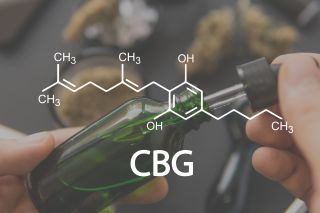CBD
Is CBG the Next CBD?
Exploring the science of the new “it” cannabinoid.
Posted August 1, 2024 Reviewed by Michelle Quirk
Key points
- Cannabigerol (CBG) is a compound found in cannabis.
- What we know of CBG’s effects is based almost exclusively on preclinical studies.
- A new paper shows CBG may reduce subjective feelings of stress and anxiety without intoxicating effects.

The legal cannabis market that emerged following the 2018 Farm Bill has led to the marketing of several lesser-known cannabinoids—compounds found almost exclusively in cannabis. It has also led to a lot of confusion because of several reasons: There are hundreds of these compounds, they all seem to have distinct properties, and relatively little clinical work has been done to establish their therapeutic properties. The vast majority of clinical work with cannabis until relatively recently had focused on delta-9 tetrahydrocannabinol (Δ9-THC), which is the primary cannabinoid that causes intoxication and is still illicit at the federal level. Other compounds, often referred to as minor cannabinoids, can cause less intoxication than Δ9-THC (as is the case with delta-8 tetrahydrocannabinol [Δ8-THC] and cannabinol [CBN]). Still others cause little to no intoxication even at high doses. The most well-known of the latter category is cannabidiol (CBD).
Recently, another non-intoxicating cannabinoid known as cannabigerol (CBG) has grown in popularity and is almost entirely unregulated. The cannabinoid is often marketed as “the mother of all cannabinoids” because its acidic form, cannabigerolic acid (CBGA), is a precursor to many other cannabinoids (including CBD and THC). The phrase “mother of all…” is here being used somewhat literally instead of idiomatically to refer to something of immense magnitude or potency. To reiterate more bluntly: It will not get you high.
What Does CBG Do?
Like CBD, grey literature and unfounded reports from the internet claim that CBG can help with a host of specific and nonspecific conditions. Among these are anxiety, depression, and fatigue. Meanwhile, preclinical research has found that CBG has demonstrated antibiotic and antifungal activity, as well as antihypertensive, analgesic, and anti-inflammatory effects.
A 2021 review by Nachnani, Raup-Konsavage, and Vrana, suggested additional therapeutic possibilities for CBG given its pharmacological activity. The authors suggest that CBG is active at cannabinoid receptors (CB1 and CB2), transient receptor potential cation channels (TRPA1, TRPV1, TRPV2, TRPV3, TRPV4, and TRPM8), peroxisome proliferator-activated receptor gamma (PPARγ), alpha-2 adrenoceptors (α2), and serotonin receptors (5-HT1A). Given its profile, they suggest that CBG could potentially help with tic disorders, attention-deficit/hyperactivity disorder (ADHD), and metabolic diseases (obesity, insulin resistance, diabetes, hyperglycemia, etc.). CBG may also serve as a neuroprotective agent that could reduce the severity of neurological illnesses, including amyotrophic lateral sclerosis (ALS), Huntington’s disease, multiple sclerosis, and Parkinson’s disease.
To be clear, none of the benefits described by the authors were based on clinical work. Nachnani and colleagues’ review was limited to preclinical evidence and the suggestion that CBG may help treat these disorders is based on the success of other medications that targeted the receptors noted above. For example, thiazolidinediones (TZD) target PPARγ receptors (as agonists) and are medications commonly used to treat type 2 diabetes and increase insulin sensitivity.
While this is certainly frustrating for people who want to know if CBG is actually effective in the real world, the good news is that clinical work is beginning to be published. Most notably, a new paper published by Cuttler, Stueber, Cooper, and Russo in Nature has examined some of the acute effects of CBG in a double-blind, placebo-controlled, crossover field trial involving 34 participants (17 in the active group, 17 in the placebo group). Their findings represent the first clinical trial to focus on the psychological effects of CBG.
The Psychological Effects of CBG
According to the authors, the primary objective was to examine the acute effects of CBG on anxiety, stress, and mood. Secondarily, the investigation assessed whether or not CBG is intoxicating and, if so, its side effects and level of impairment. The active arm received a dosage of 20 mg of CBG in a tincture.
Their findings indicate that CBG lowered participants’ subjective state ratings of anxiety. Of note, the participants had a relatively low baseline anxiety score (mean = 3.59 on a 10-point scale) but still reported a mean reduction of 0.95 or 26.5 percent (compared to 0.66 and 22.5 percent for placebo). The authors report similar findings for subjective stress ratings.
However, the effects did not translate to a notable reduction in state-trait anxiety inventory (STAI) scores. The authors note, “This pattern of findings may reflect a tendency for CBG to reduce the global impression of feelings of anxiety, rather than affecting the specific sub-components of anxiety tapped by the STAI.” Similarly, participants did not experience a notable improvement in mood or reduction in baseline depression levels.
In terms of intoxicating effects, the authors found that CBG did not impair cognition or motor function and that, in fact, CBG did not produce any intoxicating effects. Similarly, CBG did not produce any of the side effects commonly associated with intoxicating cannabinoids and marijuana, including dry eyes, dry mouth, increased appetite, somnolence, or heart palpitations. Verbal memory scores, which are acutely affected by the use of intoxicating cannabinoids and marijuana, actually improved following the use of CBG.
There are some significant limitations that should be noted. First and foremost, this was a small study involving only 34 people, so any conclusions about CBG’s risks or benefits are still premature. Secondly, the study focused on the acute effects of CBG. It’s unclear if these effects become more pronounced with use, if they remain stable, or if they begin to decline due to increased tolerance. Finally, the study was not designed to include individuals who have diagnosable mood or anxiety disorders. Therefore, if you have one of these disorders, you should continue with your prescribed medication and ask a clinician about potential drug-drug interactions before taking CBG.
Using CBG
In conclusion, CBG does not appear to cause intoxication, so people looking for an alternative high to THC will be very disappointed should they buy a product that contains only CBG. However, individuals looking for an alternative to CBD and are burdened by subjective feelings of stress or anxiety may find that CBG provides similar relief in the short term without significant side effects.




